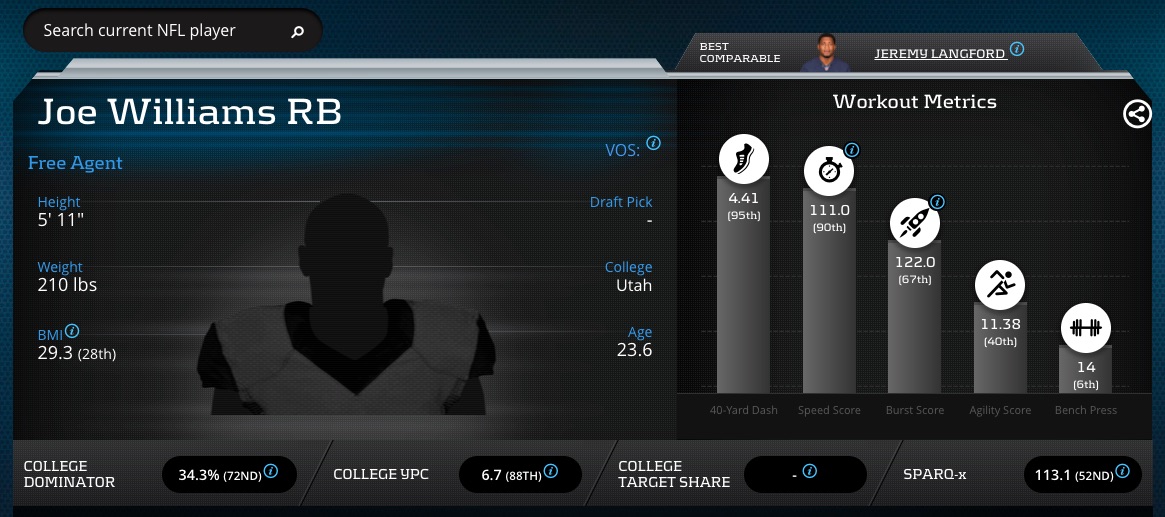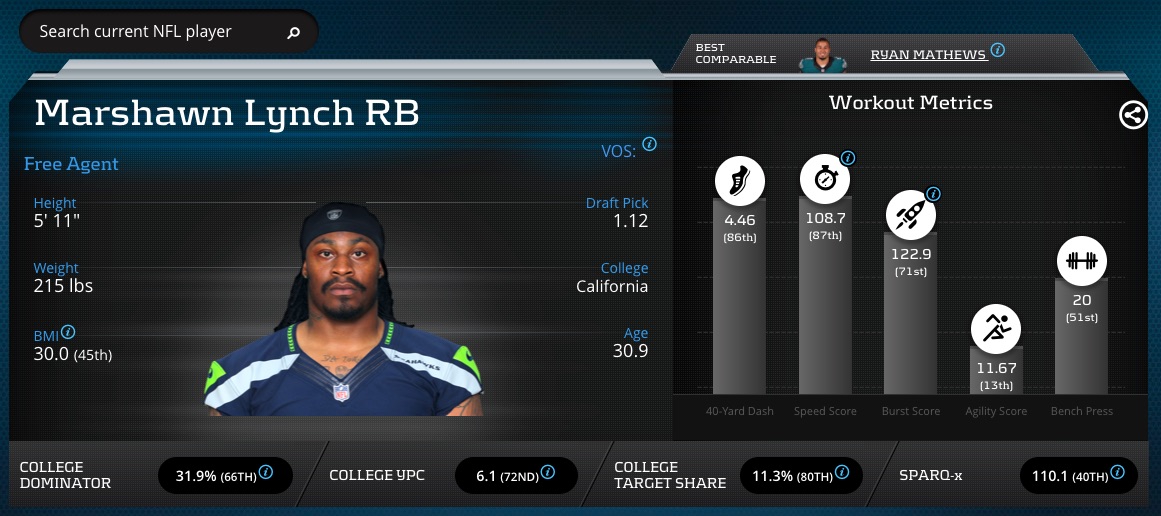Is Joe Williams is the next Marshawn Lynch? Of course not. But like Lynch, Joe Williams is an interesting, enigmatic running back.
I want to just give you a stat line to tell you about Joe Williams college career, but it’s impossible. So here’s the story. In 2013 Joe Williams was released from UConn because of a theft charge. Two years later he got a second chance in Utah. After rushing for 477 yards and 3 touchdowns behind Devontae Booker. He came back in 2016 tipped to be the team’s leading rusher. But then “retired” in early September after two games where he totaled only 75 yards and 0 touchdowns. A month later, after some injuries, the team asked him to come back and Joe Williams ran for 179 yards and a touchdown. He followed it up the next week with 332 yards and four touchdowns breaking the school’s rushing record. He ended 2016 as one of the most productive college running backs, but finished with less than 2000 total rushing yards for his entire college career.
While Joe Williams is quantitatively comparable player to Jeremy Langford, Williams is stylistically comparable to Marshawn Lynch. A brief look at the player profiles of the two brings out some interesting comparison points.

Joe Williams Advanced Stats & Metrics Profile
Both are 5-11 while Marshawn Lynch is five pounds heavier. Both ran comparable 40-times. Joe Williams is faster running a 4.41 40-yard dash (86th percentile). But both have and had plenty of speed to burn for the position. Lynch benched 225-pounds 20 times in 2007, while Joe Williams only managed 14 at this year’s NFL Scouting Combine. But if there is one physical trait I’m willing to believe is changeable it’s that they can get stronger in an NFL weight room. And if he did, and that extra muscle meant putting on another few pounds, then his 40-time might suffer a little which would only mean his metrics would look even more like Lynch’s.

Marshawn Lynch Advanced Stats & Metrics Profile
Both have similar BMI’s, Lynch’s BMI is 30.0 vs. Joe Williams‘ 29.3 BMI. Lynch and Williams make up for a relatively low BMI and a high center of gravity by exploding into defenders with a low pad level. Marshawn Lynch‘s Burst Score is 122.9 (71st percentile) and Joe Williams’ demonstrated an equally explosive 122.0 (67th percentile) Burst Score. Both Lynch and Williams posted relatively low Agility Scores, however, Williams did post an impressive 20-yard shuttle time to boost his Agility Score into the 40th percentile among NFL running backs.
Joe Williams and Marshawn Lynch both posted similarly impressive College Dominator Ratings during their final college seasons. Williams posted a mere 72 receiving yards and 0 receiving touchdowns in 2016, Andre Williams-level receiving competency. On the other hand, Marshawn Lynch achieved 600 receiving yards and 6 receiving touchdowns before leaving for the NFL.
The Williams-Lynch similarities extend off the field. Both players are retirees. Like Marshawn Lynch once walked away from the game, Joe Williams also briefly retired from football. NFL general managers may have legitimate reasons to question his passion for the game at a position that requires maximum passion to succeed.
After being suspended for theft during a brief stint a the University of Connecticut, and then retiring briefly during his time at the University of Utah, Joe Williams does not have Marshawn Lynch-level college production on his prospect resume. Williams will be 23-years old on draft day, two years older than Lynch when he came out of the University of California. More importantly, he will surely lack Lynch’s first-round draft capital, which would guarantee him a significant role in his NFL rookie season.
At best, Joe Williams projects to be a more enigmatic, less skilled Marshawn Lynch in the NFL. Joe Williams may not be Marshawn Lynch, but he is interesting.


